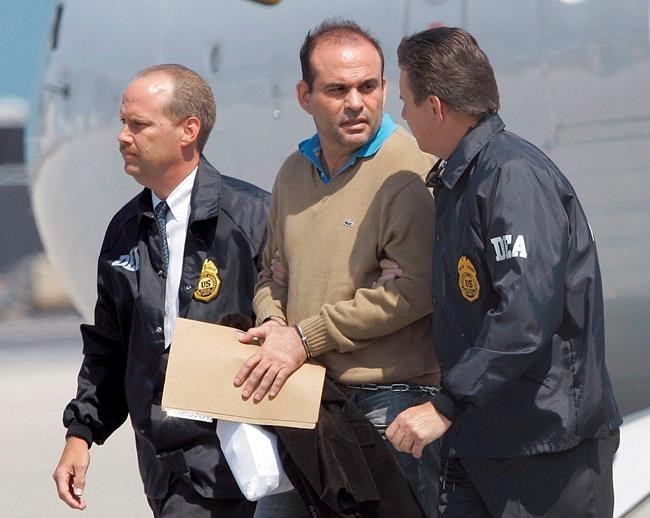
FILE - In this May 13, 2008 file photo, Colombian paramilitary warlord Salvatore Mancuso is escorted by U.S. DEA agents upon his arrival to Opa-locka, Florida. A legal battle is quietly brewing in the U.S. in 2020 over Colombia’s request that this former paramilitary warlord be sent home after completing his drug sentence in the U.S. (AP Photo/Alan Diaz, File)
August 24, 2020 - 2:00 PM
MIAMI - Attorneys for the Justice Department signalled the U.S. would deport a former Colombian paramilitary warlord to Italy within the next two weeks despite a last-minute challenge by the South American nation to seek his extradition.
The announcement came in a hearing Monday in Washington, DC federal court in which Salvatore Mancuso was seeking a judge's order to force Attorney General William Barr to immediately remove him to Italy, where he also has citizenship, after completing a 12-year narcotics sentence in March.
Mancuso, the former top commander of the United Defence Forces of Colombia, known as the AUC, argued that U.S. Immigration and Customs Enforcement have “illegally detained” Mancuso beyond the maximum 90 days allowed for the removal of aliens, according to a pre-hearing memorandum filed by his attorneys. Included in the emergency petition is a copy of a final administrative removal order dated April 15 that compels ICE to remove Mancuso to Italy.
In Monday's appearance before Judge Richard Leon, Assistant U.S. Attorney April Seabrook said she had agreed with Mancuso's attorneys on a draft order that would stay the proceedings pending Mancuso's removal by Sept. 4. She didn't say where the former warlord would be sent but Mancuso's attorneys said they expected to dismiss all claims once the removal had taken place—an indication that their client's wish to restart his life in Italy had been granted.
Mancuso's attorneys attributed the delay of Mancuso's removal to strong pressure from Colombia’s conservative government, which last week submitted to the U.S. what it said was its fourth extradition request.
One of the earlier requests was unilaterally withdrawn in July after Mancuso's legal team, led by Miami defence attorney Joaquin Perez, pointed out in U.S. federal court that it was based on an arrest order already cancelled by a Colombian judge.
It's not clear what happened to the other two requests provided to the U.S. but neither has been recognized by a U.S. court. While Colombian courts have judged Mancuso responsible for more than 1,500 acts of murder or forced disappearance, many of the crimes are not recognized as offences under U.S. law because they stem from his position atop AUC’s chain of command — not specific orders he gave. In 2001, the U.S. designated the AUC a foreign terror organization.
“Colombia has had 12 years to formalize a proper extradition request. Mr. Mancuso’s liberty should not bear the weight of government bureaucracy, or international failings; nor should this Court be the arena where such failings are raised for legitimizing an illegal detention,” Perez and two other attorneys, Héctor Mora and Manuel Retureta, wrote in their pre-hearing memorandum.
If returned home, Mancuso's lawyers argue he is likely to be jailed, or even killed, despite having fulfilled his obligations under a 2003 peace deal he negotiated, which caps prison terms at eight years for militia leaders who confess their crimes.
Mancuso, 55, was the most remorseful of the former right-wing militia leaders after demobilizing and his eagerness to discuss the paramilitaries’ war crimes has already shaken Colombia’s politics.
His boast in 2005 that a third of Colombia’s congress was elected with paramilitary support triggered a wave of judicial investigations that ended with dozens of elected officials behind bars. His lawyers contend that others still in power have not hidden their desire to find a Colombian court to order Mancuso’s arrest in an effort to silence him.
Colombian President Iván Duque this month called for Mancuso’s return, saying his “future should be in a Colombian jail cell” so he answers for “crimes against humanity.” Mancuso's lawyers argued
In 2008, then-President Alvaro Uribe stealthily extradited Mancuso and 13 other warlords to face drug charges in the U.S. His critics say the shock move, an apparent peace accord violation, was an attempt to quiet the men just as they began to reveal secrets about their crimes and politician collaborators — including Uribe, who as a governor in the 1990s backed the creation of legal, armed groups to protect ranchers’ land from leftist guerrilla fighters.
The fight over Mancuso’s future has garnered the attention of Mancuso’s many victims as well as Human Rights Watch, which accused Colombian officials of being “notably negligent” in their pursuit of Mancuso’s extradition.
According to correspondence submitted with the petition, Mancuso applied for asylum in the U.S. — where his ex-wife and youngest child were granted protection — as well as indicated that he would not oppose removal to Italy but would fight any orders sending him to Colombia.
—
Follow Goodman on Twitter; @APJoshGoodman
News from © The Associated Press, 2020